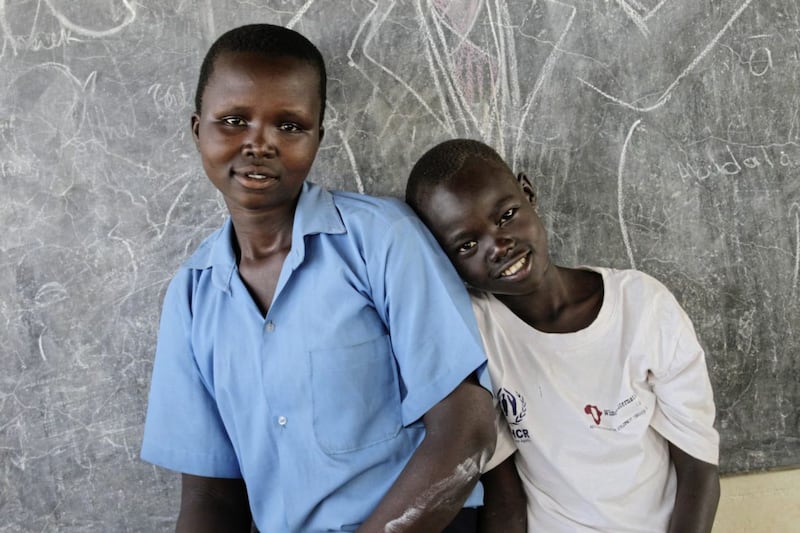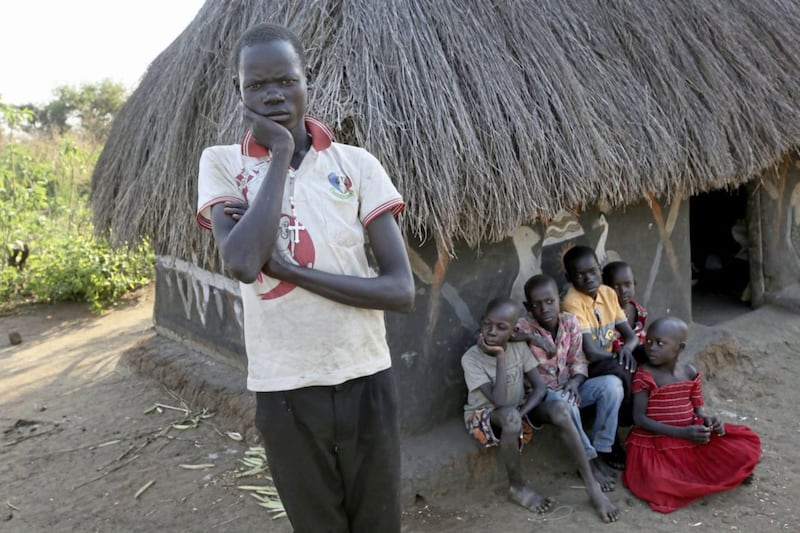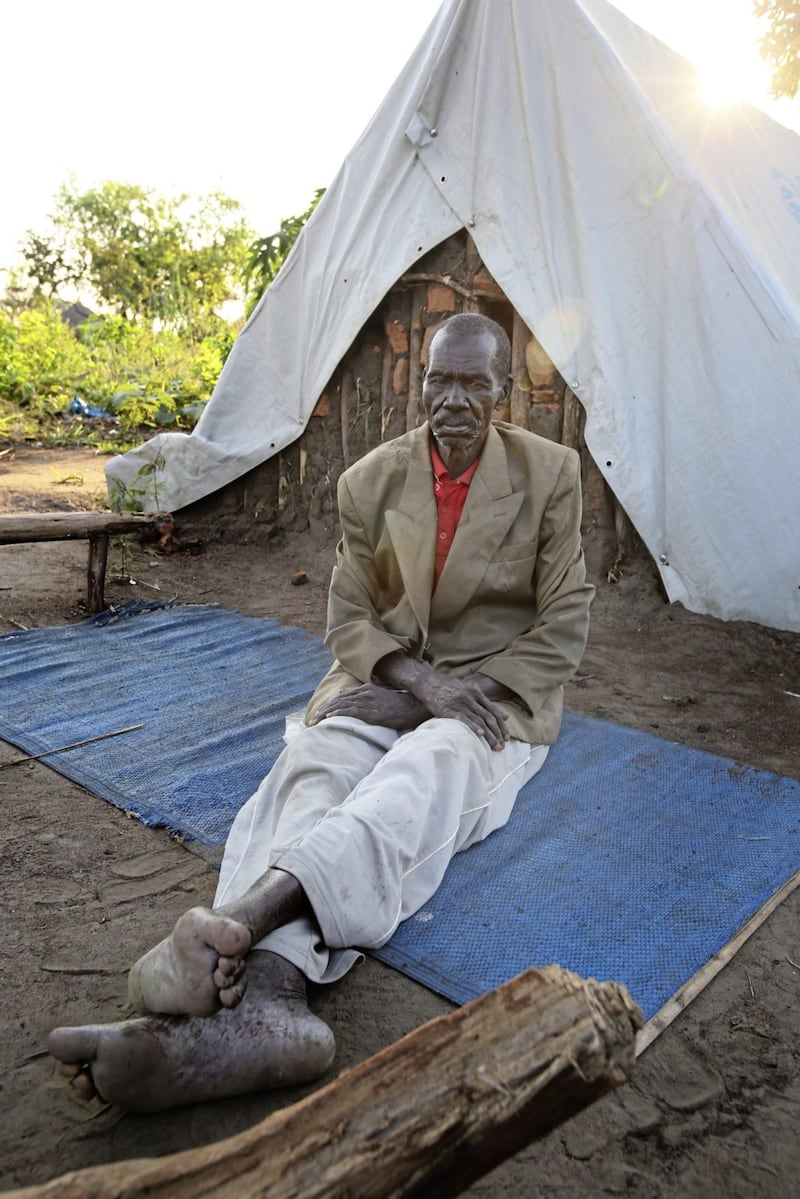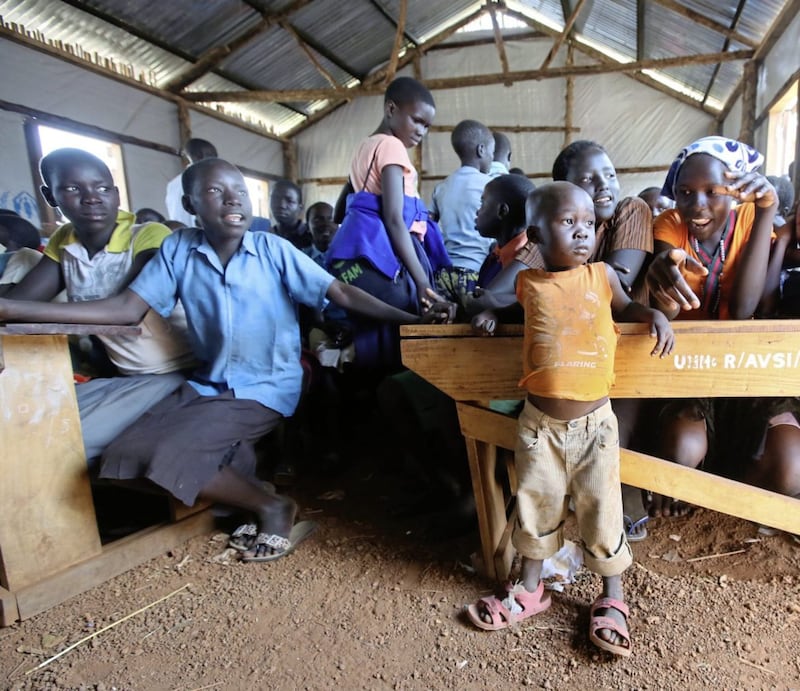The rebel gunmen lined up Thomas and his family and shot them. All of them were killed, apart from Thomas who fell to the ground with his parent and siblings and pretended to be dead.
After the gunmen had left Thomas fled from South Sudan and crossed the border into northern Uganda. He says he has only one friend and trusts nobody.
Thomas is just one of more than one million refugees who have fled the ethnic conflict in South Sudan and sought refuge in Uganda.
South Sudan is the world’s newest country, breaking away from Sudan in 2011 after years of civil war fuelled by ethnic, religious and economic tensions.
But any celebration of independence was short-lived as South Sudan descended in a brutal civil war which has claimed tens of thousands of lives and displaced millions, internally and into neighbouring countries.
North Uganda, where one million refugees have fled, is itself still recovering from decades of violence and large parts were controlled by the notorious Lords Resistance Army (LRA), led by the now-fugitive Joseph Kony.
Palabek Resettlement Camp in Lamwo District in the north of Uganda – a former stronghold of the LRA – is about 20 miles from the border with South Sudan. It was opened in April last year and is now home to around 33,000 refugees, the vast majority of them women and children.
Arriving there just over two weeks ago I expected to find a tented city, with canvas shelters set out in long uniform rows, but Uganda is at the forefront of a unique and innovative experiment in handling a mass influx of people onto its territory.
It has kept its borders open with South Sudan and all those who have fled the conflict have been welcomed and given shelter.
Typical housing in this region is a small, round brick structure with a conical straw roof, with cooking facilities in an outbuilding and communal toilets and washrooms. Water is drawn from a well by a pump.
But giving shelter is not a solution and the camp is dealing with a massive humanitarian crisis, thousands of displaced people who are traumatised by the violence they have witnessed and themselves been subjected to.
I met Thomas in Awich Nursery and Primary School, where around 1,600 pupils receive a few hours of schooling and, crucially, a meal each day.
Many of these pupils have been orphaned by the conflict and, like Thomas, psychologically scarred by it.
Camilo is 13 and spoke excellent English, with little need for the Trócaire worker who acted as a translator for me to intervene. He came from Torit in South Sudan and fled because of the violence.

“I saw a woman lying on the ground and there was blood coming from her – it was my aunty,” Camilo told me.
“I fled with my brother Joesph after my mother was killed in the war. It was in February.”
“My father was a doctor [Camilo described him as ‘minister for health’] but the rebels came and attacked him and he was killed.”
“I live with my oldest brother and he is 19 and sometimes my sister sends money from Australia.”
Children like 16-year-old Florence, who fled from Pajok in Eastern Equatoria state of South Sudan, now find themselves responsible for the welfare of their younger siblings while still trying to process their own trauma.
“Both my parents were killed and we fled with a neighbour who looked after us,” she said
“We spent a week in the bush travelling by foot until we got the border and then a vehicle took us to the camp.”
“I have three brothers aged 14,13 and five. When we fled one of them was left behind but we are now together again.”
“When we arrived we had to stay in a temporary shelter and I had to look for food. But I feel better when we are at school because we get food.”
She is now head of her family and sometimes the boys don’t do as they are told and refuse to go to school.
“When I think about what happened to us in South Sudan the trauma starts again,” Florence said.
Awich school’s headmaster Godfrey Obong has just 19 teachers to give lessons to his 1,600 pupils. Classes are held in small, rickety shelters with up to 150 pupils at a time crowded along their benches.
The floors are earth and dust and home to jiggers, parasitic fleas that burrow so deep into barefoot children that they have to be cut out by scalpel.
“Malaria is also a challenge as we don’t have a sick bay and no transport to take children to the clinic if they fall ill,” Mr Obong said.
“We don’t have enough classrooms and with such big class sizes the children can be difficult to control.”
Although Awich is a nursery and primary school many of the children are in their late teens, having missed out on basic education due to the disruption cause by the violence in their homeland.
They are taught English, maths, science and religious education – there are both Christian and Muslim pupils at the school.
Looking at a chart breaking down the number of pupils in each class, a startling fact emerges, while the numbers of boys and girls in the earlier years are almost equal, there is a sharp drop in the number of girls attending the P6 and P7 classes.
According to Vicky Monica from the organisation African Women Rising, a Trócaire-funded partner working in the camp, at the age of 12 or 13 many girls are betrothed – although in Uganda the legal age of consent is 18 – and they stop attending.
“We work with the girls and their families to try and raise awareness about the importance of education and to try to bring people back,” she said.
“Some people don’t believe in education for girls and often girls are required to help at home – but they are given a meal at the school so that is an incentive for them to come.”
Mr Obong takes me to one of the classrooms where the pupils crowd in for an English lesson. Their teacher starts a song and they join in singing about “joy and happiness”.
During the two days I spent at Palabek Resettlement Camp I heard dozens of first-hand accounts of mass murders, rapes, violence and psychological traumas suffered by those who had fled South Sudan – but that brief respite of music and laughter in the classroom was one of the most heart-breaking things I have ever witnessed.

Teenager bringing up his younger siblings
Richard Mwaka lives in dread of one of his younger siblings being abducted and “sacrificed”.
He is 17, but looks much younger, his eyes fixed on some distant point, his voice low and monotone.
His father died of natural causes two years ago and in August last year his mother decided to flee the violence of South Sudan.
“People were being killed and so we left, but my mother went back to get some items and met the rebels and they killed her,” says Richard.
Richard and his four younger brothers, Godfrey (14), Regan (12) Ivan Agnerwot (nine), Ivan Onono (five) and little sister Prossy (seven) continued to the border with their aunt, but she stayed in South Sudan and they crossed by themselves into Uganda.
Although the aunt comes to visit them now and again and they have an older sister, attending school in another part of Uganda, Ivan is now head of his family and responsible for his younger siblings.
He tries to go to school but often misses classes because he works as a farm labourer to earn money or has to queue to receive rations.
He doesn’t like to leave the other children alone in their hut and so he brings them with him.
A worker from the Trócaire supported organisation AWYAD (African Women and Youth Action for Development) tells me that a child was abducted and found murdered in the camp.
Such incidents are bad enough but rumours spread quickly that the child had been sacrificed, although there was no evidence of this.
Richard says he learnt from his late mother how to cook and grow vegetables and that when they fled they brought two chickens which have since produced offspring.
“I get up early in the morning and go to school but when we come back I have to go to work and sometimes I have to miss school to earn extra money” he says.
They do get some support from fellow refugees and AWYAD is on hand to give them counselling and help, but the future for Richard and his brothers and sisters is uncertain.
When asked if he would like to return to his homeland, just over 20 miles away across the border, he shakes his head.
“No,” he says and once again those eyes seem to focus into an imponderable distance.
'No hope for peace in South Sudan'

“I am just waiting for death,” says Jildo Banya, as he sits outside a tiny shelter made from wood and canvas.
He is 85 and in poor health and can’t move too far from shack outside which he sits.
His wife died more than 20 years ago and when fighting in his native South Sudan came too close to his home he fled from the field where he was working with nothing but the tools he was using.
“The war was too much. I used the bush for cover until I reached the main road to the border,” Mr Banya said.
“But even that was dangerous because all the roads were ambushed by the rebels. In the bush I used fire to drive away the bees from their nests to get honey to stay alive. I was three days in the bush.”
In his homeland Mr Banya worked as a peasant farmer and had a small plot of land. His son and grandchildren are still in South Sudan and although he has had no direct contact he has heard from neighbours that they are still alive.
His daughter and her children are also in the Palabek Resettlement Camp, but in another section and they are only occasional visitors.
Mr Banya can barely walk but has to fetch his own water and queue for food as he can longer grow his own. His case has been referred to the camp authorities by Tróciare partners, but after seven months nothing has been done.
He holds out little hope for peace in South Sudan as this is the second time he has fled his home during the decades of conflict that have affected the region.
“I don’t even think about going back. It is best for me to stay here where I can at least get some food,” he says.
“There is no hope for peace in South Sudan, there has been too much violence and if the rebels are overthrown someone else will just start fighting.”
Integrating into host community

When Paska Amdo saw three of her neighbours being shot dead by South Sudanese rebels she decided to flee.
The 28-year-old mother said life in her region had been good before the rebels attacked.
Sitting with her six-week-old baby who was born in Palabek refugee camp, she has no desire to return to her homeland in the near future.
“The fighting is still going on. My husband’s brother was killed in the conflict,” she says
“There was rampant death everywhere and when we were fleeing I didn’t know if we would be saved.
“Some of my family are still in South Sudan. I have heard from people who have gone back that they are fine but suffering from illness.”
As well as her baby, Paska has three other children, aged three, five and seven – another child died of natural causes in South Sudan. She and her husband their family fled the country on a motorbike.
“We stayed in the bush for a few nights until we reached the border and then we were taken here.”
Paska and her husband Obwo were allocated a plot of land at Palabek Resettlement Camp where Obwo built their hut and cooking area.
At first he found it difficult to get work but is now working for the community and helping to distribute goods.
Thanks to the Trócaire-sponsored African Women Rising, Paska has been receiving training in permaculture and tends her crops which supplements the family diet and earns money by selling on the surplus.
The family are still dependent on food distributed by the UN, but the training she is receiving is helping her to go some way to becoming less dependent and being a net contributor to her host community.
“We interact with the local community and they have made us very welcome,” says Paska.
“Life is still difficult but I think we should stay here until my children have finished school.
“I worry about my family in South Sudan – I can only think of my mother.”
A home from home

When refugees fleeing South Sudan cross the border into Uganda they are taken from collection points “for screening and profile".
They refugee camps, or as the Uganda authorities refer to them resettlement camps are run by the office of the prime minister.
Refugees are referred to as People of Concern (POC).
Camps, such as the one that I visited at Palabek, which was established in April last year are entirely integrated into the host community where “POCs co-exist with hosts, play together and farm together”.
Working with landowners in the region the POCs are allocated a small plot of land on which they can build shelter and grow their own food.
Palabeks’s assistant commander Axel Okurt said the concept is the first in world and hopes other countries take it up.
“It is a home from home for the people of concern,” he said.
“The land still belongs to hosts, but we engage with land owners and they give land freely. We are very proud of them and the land will go back to owners
“There are Incentives for the host community, bringing benefits such as schools, health care and new roads. We aim to keep a mix of children at school – 70/30 of POCs to host community.”
There are around 33,000 refugees from South Sudan in Palabek and around one million throughout Uganda. It is a massive humanitarian crisis and the relief operation is being coordinated by the UN.
“We want people to become self-sustaining,” Mr Okurt said
“Zone leaders and block leaders are elected to run the settlement and this replicate Ugandan government structures.”
Mr Okurt says that anyone crossing into Uganda must leave any weapons at the border and that the Ugandan government is working to ensure that the bitter rivalries that are tearing South Sudan apart do not spill over the border.
“We have seen reconciliation take place and we want to get a position of voluntary repatriation,” he said
To donate to Trócaire call 0800 912 1200 (1850 408 408 in ROI) or visit trocaire.org/donate
Read more: South Sudan refugee crisis - money raised in Ireland helping those fleeing violence








